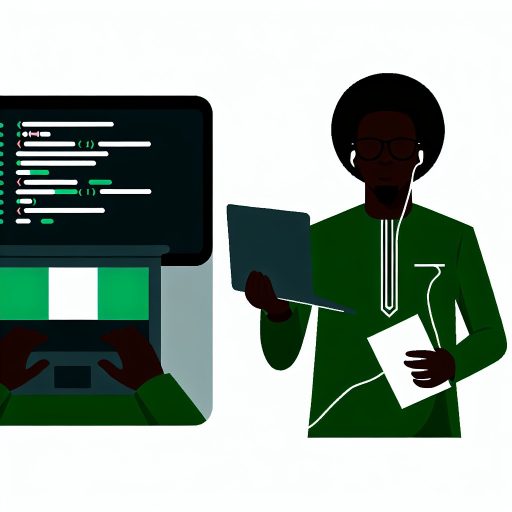Introduction to Programming Languages and Their Role in Local Development
The Importance of Programming Languages
Programming languages serve as the foundation for software development.
They enable developers to create various applications and tools.
Ultimately, these technologies can drive local economic growth.
Local Development Needs
Local needs significantly influence programming language preferences.
For example, regions may prioritize specific industries, such as agriculture.
Consequently, developers often choose languages suited to these sectors.
Popular Programming Languages in Nigeria
In Nigeria, several programming languages have gained popularity.
- Java is commonly used in enterprise-level applications.
- Python is favored for data analysis and machine learning.
- JavaScript powers many web-based applications and services.
Education and Training Opportunities
Access to education shapes language preferences significantly.
Many universities offer courses in trending programming languages.
This exposure helps local developers make informed choices.
Community and Collaboration
Collaborative projects enhance the programming landscape.
Local meetups and online forums foster knowledge sharing.
Such initiatives often lead to the adoption of certain languages.
Overview of Nigeria’s Tech Ecosystem and Coding Landscape
The Growing Tech Scene
Nigeria’s tech ecosystem is rapidly evolving.
The country boasts numerous startups and tech hubs.
Unlock Your Unique Tech Path
Get expert tech consulting tailored just for you. Receive personalized advice and solutions within 1-3 business days.
Get StartedMoreover, cities like Lagos and Abuja are thriving centers for innovation.
This growth attracts both local and international investors.
Consequently, the demand for skilled programmers continues to rise.
The Role of Coding Bootcamps
Coding bootcamps play a crucial role in the ecosystem.
They provide intensive training for aspiring developers.
For instance, programs like Decagon and Andela are popular.
These bootcamps focus on relevant languages and frameworks.
As a result, graduates find jobs more easily in the tech environment.
Programming Language Preferences
Local needs significantly shape programming language choices.
Web development frameworks are in high demand.
Javascript frameworks like React and Angular are popular choices.
Additionally, Python has gained momentum in data science.
This preference is driven by local industry requirements.
Community and Collaboration
A vibrant tech community fosters collaboration.
Unlock Premium Source Code for Your Projects!
Accelerate your development with our expert-crafted, reusable source code. Perfect for e-commerce, blogs, and portfolios. Study, modify, and build like a pro. Exclusive to Nigeria Coding Academy!
Get CodeMeetups and hackathons are common events in Nigeria.
They provide opportunities for networking and skill sharing.
Local developers often collaborate on open-source projects.
This collaboration enhances their coding skills and community ties.
Challenges Faced by Developers
Despite the growth, challenges persist.
Access to reliable internet remains a significant issue.
Furthermore, limited funding hampers startup growth.
Additionally, talent retention is a growing concern.
Many skilled developers seek opportunities abroad.
The Future of Nigeria’s Tech Landscape
The future looks bright for Nigeria’s tech sector.
Continued investment is crucial for sustainable growth.
Furthermore, increasing awareness of coding careers creates excitement.
This momentum will likely attract more tech giants to Nigeria.
Nigeria’s unique challenges will continue to shape programming language preferences.
Influence of Local Economic Factors on Programming Language Choices
Market Demand
Market demand significantly influences programming language preferences in Nigeria.
Businesses seek languages that align with local project requirements.
For instance, JavaScript remains popular for web development projects.
Moreover, Python gains traction due to its extensive data analysis capabilities.
Employment Opportunities
Employment opportunities shape the choice of programming languages among developers.
Organizations often prefer candidates with skills in certain languages.
In Nigeria, languages like Java and C# dominate job listings.
This trend encourages developers to acquire these skills.
Educational Institutions
Educational institutions play a crucial role in language preference development.
Curricula often emphasize certain programming languages over others.
As a result, graduates possess skills aligned with the local job market.
Universities frequently teach languages like PHP and Python.
Access to Learning Resources
Access to learning resources impacts the programming languages people choose to learn.
Online platforms provide extensive courses in popular languages.
This accessibility boosts the learning of languages like JavaScript and Python.
Consequently, developers become more proficient in these languages.
Community Support
Community support fosters the development of specific programming languages.
Local tech communities promote languages through meetups and online forums.
For example, enthusiastic Python groups encourage collaboration and learning.
This support network attracts new developers to the language.
Adaptation to Local Industries
Local industries also impact programming language preference.
Industries demand languages that cater to their specific needs.
Financial technology, for example, often requires robust security features.
This requirement drives the preference for languages like Java and C++.
Learn More: Why Learning C++ Opens Doors to High-Impact Tech Roles
Cultural Preferences and Their Impact on Programming Language Adoption
Understanding Cultural Context
Cultural context plays a critical role in technology adoption.
In Nigeria, cultural diversity influences programming language preferences significantly.
Different communities often prioritize distinct programming languages based on their needs.
Language and Educational Background
Education systems across Nigeria vary greatly.
These disparities affect exposure to specific programming languages.
For instance, universities in Lagos may focus on Python.
Conversely, schools in rural areas might emphasize Java.
Such educational focus creates lasting preferences among graduates.
Economic Drivers
Economic factors also dictate language popularity.
Local job markets impact demand for specific programming languages.
As a result, languages aligning with available jobs see higher adoption.
Areas with thriving tech startups often prefer JavaScript for web development.
This trend illustrates how local economies shape programming choices.
Community Influences
Community dynamics influence the learning of programming languages.
Peer recommendations often guide individuals toward popular languages.
Northern Nigeria, for instance, shows a preference for languages used in mobile tech.
This reflects community leaders who promote tech education initiatives.
Access to Resources
Access to technical resources shapes language preferences as well.
Regions with better internet connectivity often lean towards online languages.
This trend highlights the role of internet access in programming learning.
Furthermore, availability of tutorials and documentation fosters language adoption.
Cultural Relevance of Programming Languages
Some languages resonate more with local cultural practices.
For example, PHP is favored in communities with strong web applications.
This cultural fit ensures that programming languages meet specific local needs.
Technologies that facilitate local communication gain higher acceptance.
Impact of Local Trends on Programming Choices
Local needs markedly shape programming language preferences in Nigeria.
These preferences are influenced by education, economics, community, and resource access.
Continued collaboration among educational institutions and industries can enhance suitability.
Thus, recognizing local cultural preferences is essential for fostering effective programming education.
You Might Also Like: Top Programming Languages Nigerians Should Learn to Stay Competitive
Educational Institutions and Their Role in Shaping Language Preferences
Influence of Universities on Programming Choices
Universities significantly influence the programming languages students prefer.
These institutions often adopt specific languages for their curricula.
For instance, the University of Lagos emphasizes Python due to its versatility.
Similarly, Ahmadu Bello University focuses on Java, known for enterprise applications.
Moreover, students tend to align with the languages taught in their courses.
Training and Skills Development
Training programs also play a crucial role in shaping language preferences.
Technical schools and coding boot camps frequently update their course offerings.
They respond to industry demands, ensuring that students learn relevant skills.
Consequently, many graduates favor languages that guarantee job placements.
Collaboration with Tech Companies
Partnerships between educational institutions and tech companies enhance programming options.
Companies like Andela and Flutterwave offer internships that influence language choices.
Students often adopt languages that these firms prioritize in their technologies.
This collaboration ensures that students remain competitive in the job market.
Research and Innovation
Research initiatives in academic settings further shape language preferences.
Institutions focus on innovative programming languages for research projects.
For example, code systems tailored for artificial intelligence gain popularity.
These innovative projects encourage students to explore new languages actively.
Industry-Specific Programming Needs
Local industry requirements also dictate preferred programming languages.
In Nigeria, sectors such as fintech demand specific languages like Kotlin.
Consequently, educational institutions adapt their curricula to meet these needs.
This adaptability ensures students are well-prepared for local job markets.
See Related Content: The Fastest-Growing Programming Languages Nigerian Developers Should Master

Case Studies of Successful Local Projects Using Specific Programming Languages
Project Insight: Mobile Health Application
This project successfully utilized Java for its mobile health application.
The application supports health workers in remote Nigerian communities.
It enhances communication and service delivery during health crises.
Additionally, it allows real-time reporting of health incidents.
Users praise its user-friendly interface and quick response time.
Software Development: E-commerce Platform
PHP powered a local e-commerce platform known as Jumia.
This platform connects local vendors to consumers across Nigeria.
It helps boost the economy by promoting small businesses.
The platform is expanding its services to include rural areas.
Feedback indicates that users appreciate its accessibility and convenience.
Educational Tools: Learning Management System
Python was used to develop an innovative learning management system.
This system helps schools facilitate online learning effectively.
Teachers can create and manage courses with ease.
Students benefit from interactive features enhancing their learning experience.
The project gained recognition for improving educational outcomes in urban areas.
Agricultural Directory: Connecting Farmers with Markets
A local startup utilized Ruby on Rails for an agricultural marketplace.
The platform connects farmers directly to consumers and vendors.
Farmers can showcase their products and receive real-time market feedback.
This initiative has boosted sales and reduced food waste.
Moreover, it empowers farmers with valuable market knowledge.
These case studies highlight the significance of local programming language preferences.
They reveal how technology can address specific community needs effectively.
Moreover, they encourage innovation and economic growth in Nigeria.
Gain More Insights: Why Python is a Game-Changer for Data Scientists in Nigeria
Challenges Faced by Developers in Relation to Global Language Trends
Adapting to Rapid Changes
The programming environment evolves rapidly worldwide.
Nigerian developers often struggle to keep pace with emerging languages.
Consequently, they face challenges in mastering new technologies.
This difficulty hinders their ability to innovate effectively.
Resource Limitations
Resources for learning programming languages can be scarce in Nigeria.
Access to quality educational materials remains a significant issue.
In addition, high-quality online courses may not be readily available.
As a result, developers may resort to outdated resources.
Economic Factors
The economic climate affects tech investments in Nigeria.
Many companies prioritize cost-effective solutions over new technology.
This focus limits the adoption of popular programming languages globally.
Consequently, developers may find themselves constrained by outdated tools.
Community Support
The availability of community support impacts language preferences.
Developers often rely on local networks for guidance and collaboration.
When a language lacks local advocacy, interest diminishes rapidly.
Thus, community-driven languages may dominate over globally trending ones.
Cultural Considerations
Cultural factors play a significant role in technology adoption.
Local needs often dictate the preferred programming languages.
Nigerian developers may prioritize languages that cater to local challenges.
This prioritization drives demand for specific languages over others.
Future Trends in Programming Languages Influenced by Local Needs
Emerging Technology Demands
Local industries significantly shape programming language trends in Nigeria.
For instance, fintech companies require robust security features.
As a result, languages like Python and Java become increasingly popular.
These languages support the development of secure financial applications.
Government Initiatives and Standardization
Government policies drive the adoption of specific programming languages.
Initiatives like digital literacy promotion encourage Python education.
This focus aligns with global trends in data science and automation.
Regional Development and Collaboration
Regional tech hubs foster collaboration among developers.
Such environments promote languages that enhance teamwork and project sharing.
Consequently, languages like JavaScript gain traction due to web development needs.
Education and Skill Development
Educational institutions impact language preferences through curriculum choices.
Increasingly, universities offer courses in popular languages like Java and C#.
This accessibility enhances job readiness among graduates.
Local Community Engagement
Community coding events highlight local programming language interests.
They encourage the adoption of languages that enhance engagement and collaboration.
For example, JavaScript is popular due to its versatility in web projects.
Future Perspectives
As technology evolves, new languages will emerge to meet local needs.
Developers must remain agile and open to adapting to these changes.
Innovation will likely drive demand for languages that support modern solutions.
Additional Resources
Chinasa T. Okolo, Ph.D. on LinkedIn: How Infrastructure, Education …
Thematic Analysis: Striving to Meet the Trustworthiness Criteria …




